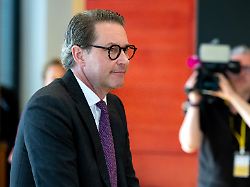Negligence in car tolls
Wissing has Scheuer check for damages
07/31/2023, 5:45 am
Andreas Scheuer leaves taxpayers with an expensive legacy: his failed toll project costs 243 million euros. His successor in the Ministry of Transport is examining the extent to which the federal government can take recourse against the CSU politician.
Federal Transport Minister Volker Wissing wants to have possible claims for damages against his predecessor Andreas Scheuer because of the bursting of the car toll thoroughly clarified. “We can’t just put the file aside at 243 million euros,” said the FDP politician, with a view to the federal government’s due payments to the toll operators that were once planned. A claim to Scheuer should therefore be examined carefully.
“We’re having an external report drawn up to clarify legal issues. Ultimately, this isn’t a political question, it’s a legal question. To do this, the degree of negligence must be examined,” says Wissing. It will take some time for the report to be completed. “As a minister, I also have to protect the property interests of the Federal Republic of Germany,” said Wissing. “And if there should be the possibility of taking recourse against someone, then it would be my job to ensure that these recourse claims are enforced and that the files are not simply put in the basement. That’s why there is this report and this examination .”
As a result of the collapse of the car toll, the federal government has to pay 243 million euros in damages to the operators that were originally intended. This resulted in an agreement after arbitration. The car toll – a prestige project of the CSU in the then federal government – was classified as illegal and stopped by the European Court of Justice (ECJ) in 2019. The operator side initially demanded 560 million euros in damages after the federal government had terminated the contracts shortly after the verdict.
Requirements for recourse met?
The ministry had already announced in principle that it would examine possible recourse claims against Scheuer. “The report will enable us to say with a clear conscience why recourse is possible or not possible in this specific case,” said Wissing. “There is no question that damage has occurred. It can be precisely quantified. However, there must be other prerequisites for legal responsibility and thus recourse. The report should work out these and then check whether they exist in the specific case.” Wissing said that of course you need a legal basis for a recourse claim. “You have to look at that. But I don’t want to expose myself to the accusation that I didn’t do it with all due care.”
A recourse claim against the CSU politician Scheuer is legally difficult. In 2019, the scientific service of the Bundestag wrote in an analysis that Article 34 of the Basic Law allows the state to take recourse against the “acting official” in cases of intent or gross negligence. This possibility requires a corresponding law or a contractual basis. In relation to federal civil servants, the legislature created a regulation. However, the Federal Ministers Act relevant to federal ministers does not provide for such a possibility of recourse.
Scheuer was Minister when the toll burst in 2019. The main sticking point was that, according to the model, only domestic drivers for toll payments should be fully relieved of vehicle tax. Contrary to all warnings, Scheuer had already concluded the operator contracts at the end of 2018, even before there was final legal certainty at the European Court of Justice.
During the past electoral term, a committee of inquiry in the Bundestag also dealt with the failure of the toll and the financial consequences. The opposition at the time accused Scheuer of violating budgetary and public procurement law and warned of the cost in the millions. Scheuer rejected all allegations. Wissing gave a clear rejection of a possible new attempt at a car toll: “We are now introducing a higher truck toll in the European context and also want to have a CO2-related truck toll. I don’t believe in national solo efforts on these toll issues. We saw where that could lead in Germany under my predecessor. At the moment, I’m more concerned with the question of how individual transport can continue to be made affordable, attractive and as climate-neutral as possible for everyone in the future.”
